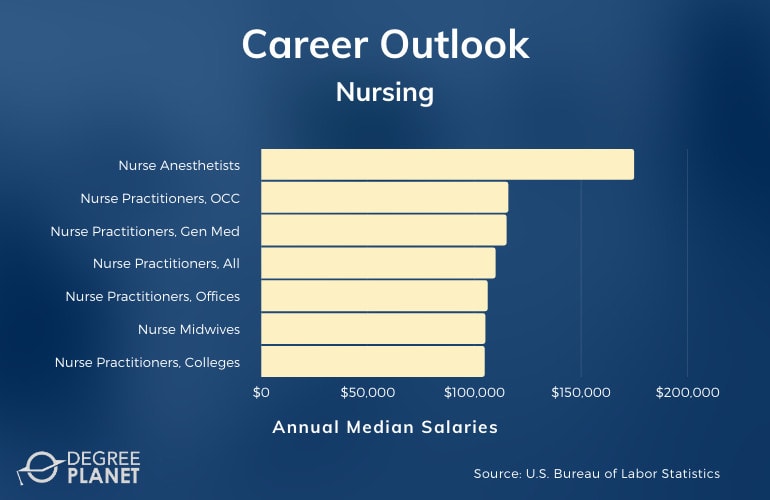Is being a nurse practitioner worth it? There are many reasons why a registered nurse may choose to pursue a nurse practitioner degree.

Nursing positions are lucrative, and with high pay and increased demand, it can be a great field to advance in.
Editorial Listing ShortCode:
Nursing can also be a very rewarding field, especially if you want to help change someone’s life for the better.
Is Being a Nurse Practitioner Worth It?

Yes, becoming a nurse practitioner is worth it for many nursing students. If you want continued growth and opportunity in your nursing career, then going on for your NP degree can be a strategic career move.
The Bureau of Labor Statistics compiled a list of the 20 fastest growing occupations across the nation, and 9 of those occupations are directly related to the medical industry. Nurse practitioner is number 2 on that list with expected job growth of 52% through the next ten years.
This tremendous growth is the result of the increased demand in health care services, particularly for preventative care and the aging population.
Editorial Listing ShortCode:
The Bureau of Labor Statistics predicts 110,700 new job openings each year over the next ten years. This is in addition to the more than 211,300 nurse practitioners already in the field. Demand is often higher in medically underserved areas, such as inner cities and rural areas.
In fact, in many of these areas, nurse practitioners are replacing physicians. Numerous states are expanding the services nurse practitioners are permitted to perform as well.
As a result, nurse practitioners perform many of the same duties as physicians. They are also needed for team-based models of care in hospitals, clinics, ambulatory centers, and in physicians’ offices.
There are many reasons why nurses decide to continue their education and become nurse practitioners, but you have to determine whether it is the right path for you.
How to Decide Whether Becoming a Nurse Practitioner Is Right for You

If you believe in a more holistic approach to healthcare and are passionate about helping people live healthier lives and, then becoming a nurse practitioner might be a strategic career move for you.
Does working directly with patients appeal to you? Do you want to improve the delivery of healthcare, both now and in the future? Or do you want to serve where there is a physician shortage?
There are many reasons why you might want to pursue a career as a nurse practitioner.
1. You want a fulfilling career.

Nursing is hard, stimulating work, and being a nurse is worth it for many people who work in this field. Nurses are fast thinkers and quick on their feet with a love for learning new things.
Nurse practitioners play an active role in the care of others, through education, diagnostics, prevention, and treatment. If serving others is your calling, becoming a nurse practitioner may just feed your passion.
2. You enjoy autonomy.

One of the advantages of being a nurse practitioner is that they have the opportunity to perform nearly the same services as physicians.
In some states, they can start their own practices. Nurse practitioners are often self-sufficient and ambitious people, and some choose this occupation because of the level of autonomy it offers. The District of Columbia and 21 states currently permit nurse practitioners to practice without direct supervision from a physician.
3. You want to treat patients without med school.
Many nurse practitioners chose this career path because they wanted to provide the same services as physicians but did not want to spend so much time in school.
Editorial Listing ShortCode:
Nurse practitioners can make diagnoses, make treatment plans, treat patients, interpret diagnostic tests, refer patients to specialists, and prescribe medications—just like a physician can.
Types of Nurse Practitioners

Nurse practitioners can serve many different populations and specialties. Here are just a few examples of specializations for nurse practitioners:
- Adult gerontology primary care nurse practitioner. These nurse practitioners provide preventative health care and management of acute and chronic health issues for adults. They often work in internal medicine units, clinics, student health centers, and ambulatory centers.
- Cardiac nurse practitioner. A cardiac nurse practitioner performs cardiovascular assessments, interprets results, and manages treatments. They often work in private practice, cardiology offices, and hospitals.
- Family nurse practitioner. A family nurse practitioner focuses on family healthcare services for patients of all ages. These nurse practitioners often take on the tasks of a physician.
- Pediatric nurse practitioner. A pediatric nurse practitioner works right alongside physicians to provide care to children, from infants to 21 years of age. They provide wellness services and preventative care and manage common health conditions.
- Psychiatric and mental health nurse practitioner. These nurse practitioners provide assessments, diagnoses, and treatments of patients of all ages. They work in inpatient psychiatric facilities, mental health centers, schools, and correctional facilities. They can also work as home health providers.
There are still many more specialties and different ways to serve as a nurse practitioner.
Nursing Master’s Careers & Salaries

According to the Bureau of Labor Statistics, the median salary for nurse practitioners is $109,820 per year. The below chart includes other careers that can also be pursued with a masters degree in nursing.
| Careers | Annual Median Salaries |
| Nurse Anesthetists | $174,790 |
| Nurse Practitioners, Outpatient Care Centers | $115,790 |
| Nurse Practitioners, General Medical and Surgical Hospitals | $114,980 |
| Nurse Practitioners, All | $109,820 |
| Nurse Practitioners, Offices of Physicians | $106,120 |
| Nurse Midwives | $105,030 |
| Nurse Practitioners, Colleges, Universities, and Professional Schools | $104,710 |
| Medical and Health Services Managers | $100,980 |
| Nursing Instructors and Postsecondary Teachers | $74,600 |
| Registered Nurses | $73,300 |
While some specialties pay more than others, nurse practitioner careers in general earn far more than the national average and well above the average salary for registered nurses.
How to Become a Nurse Practitioner
The steps to becoming a nurse practitioner can vary according to state, so you may want to check with your local board before applying for grad school.
Editorial Listing ShortCode:
Also, before becoming a nurse practitioner, you need to be a registered nurse with a Bachelor of Science in Nursing. You cannot become a nurse practitioner if you hold only an associate degree in nursing.
Common steps to becoming a nurse practitioner include the following:
- Pursue national certification as RN. It is recommended that you pursue national certification in any specialty areas that interest you. You can do this by completing field work and exams in these focus areas while working as a registered nurse. Many states require these national certifications in order to become a nurse practitioner.
- Earn MSN degree. The next step is to apply to an accredited Master of Science in Nursing program. These programs incorporate clinical work and specialization to prepare students for specific careers as a nurse practitioner.
- Obtain specialty certification. After obtaining a NP degree, the next step is to earn national NP certification in the area you specialized in. Certification usually involves evidence of clinical work and the fulfillment of required academic standards. You can also expect to pay an application fee and take a certification exam.
- Obtain state licensure. The last step is to obtain your state license. You may be required to show proof of a collaborative agreement with a physician and acknowledgement of board standards. A fee is associated with state licensure.
If you hold a bachelors degree in a non-nursing field, some universities offer direct entry MSN programs with no GRE requirements, in which you can earn a masters in nursing while also learning the basics of the profession.
If you choose to do so, you can also go on to pursue a doctorate. It’s possible that the National Organization of Nurse Practitioner Faculties will require all nurse practitioners to have a doctorate in the coming years, though this is not a current requirement for certification.
What Is a NP?

A nurse practitioner is an advanced practice registered nurse (APRN) who has earned at least a masters degree in nursing and has completed additional training in an area of specialty. Nurse practitioners have more authority for administering patient care than registered nurses.
Their scope of practice varies from state to state, but they can generally provide advanced medical treatment similar to a physician. Some states, though, require supervision of their patient care by a physician. Nurse practitioners can provide both primary and specialty healthcare.
What Does a Nurse Practitioner Do?

A nurse practitioner typically specializes in a core area, such as serving a specific population of patients who need a certain type of care. NPs may take a more wholistic approach to healthcare, focusing on education and preventative care.
General duties of a nurse practitioner can include:
- Performing physical exams
- Diagnosing and treating injuries, illnesses, and infections
- Prescribing medication
- Ordering and performing diagnostic tests
- Designing treatment plans
- Examining and recording medical histories
- Teaching patients about their health
- Conducting research
Nurse practitioners work in a variety of settings, depending on their specialization. Some even have their own practices.
What Are the Pros and Cons of Being a Nurse Practitioner?

When deciding if a NP degree is right for you, it can help to consider the pros and cons of being a nurse practitioner.
Advantages:
- Demand. The Bureau of Labor Statistics expects employment for nurse practitioners to grow 52% in the next decade.
- Competitive pay. The high demand and the higher educational requirement for NPs generally equals higher pay.
- Specialization. Most nurse practitioners get to specialize in an area that they are passionate about.
- Telehealth. Some may enjoy the flexibility and convenience of working from home in a telehealth position.
- Respect. This is a demanding field that requires a high level of compassion and knowledge.
Disadvantages:
- Education. At least a masters degree is required to become an NP.
- Work schedule. You may find yourself with a nontraditional work schedule.
- Emotional stress. Depending on your specialization, you may work with patients dealing with trauma or a terminal illness.
- Legal responsibilities. Diagnosing and treating patients may open you up to lawsuits.
- Student loans. Higher education can be costly.
It can help to carefully weigh your own pros and cons when deciding whether to pursue the nurse practitioner career path.
How Much Does a Nurse Practitioner Make?

According to the Bureau of Labor Statistics, the median wage for nurse practitioners is $109,820. This means half of all nurse practitioners make more than $109,820, and half make less.
Nurse practitioners’ salaries currently range from less than $81,410 to more than $152,160. How much you earn as a nurse practitioner will typically depend on what you specialize in and where you work.
Editorial Listing ShortCode:
For instance, the median salary for nurse practitioners who work in outpatient care centers is $115,790, and the median salary for those who work in physicians’ offices is $106,120.
Is Being a Nurse Practitioner Hard?
Being a nurse practitioner can be demanding, but it can also be very rewarding. Nurse practitioners are typically conscientious, compassionate people. They often need to show a lot of patience under stress and have great listening skills. Nurse practitioners may also be very flexible with excellent organizational skills.
These skills impact their work since nurse practitioners often don’t know what to expect from one patient to the next. Every situation is new, and they have to be able to make decisions quickly. You may enjoy the daily schedule of a nurse practitioner if you thrive in a high-paced, challenging environment.
How Long Does It Take to Become a Nurse Practitioner?

How long it takes you to become a nurse practitioner can depend on what tract you take, what you specialize in, and how long it takes you to fulfill certification and licensing requirements.
A masters in nursing is the academic requirement for becoming a nurse practitioner. An MSN can take anywhere from 2 to 4 years to complete, depending on whether you attend part-time or full-time.
If you choose to go on to pursue a Doctor of Nursing Practice (DNP), it may take another 3 to 4 years to complete.
What Is the Difference Between a Nurse Practitioner vs. RN?
The biggest differences between a nurse practitioner and a registered nurse is their educational level and the services they can provide.
| Nurse Practitioner | Registered Nurse |
| Requires at least a masters in nursing | Requires at least an associates in nursing or a diploma from an approved nursing program |
| Median salary of $109,820 | Median salary of $73,300 |
| Can prescribe medications | Cannot prescribe medications |
| Takes, analyzes, and interprets patient history | Records patient history |
| Orders and performs diagnostic tests | Orders diagnostic tests |
| Diagnoses and treats patients | Assists physicians with treatment and exams |
| Creates treatment plans | Shares treatment plans with patient |
| Expected job growth of 52% | Expected job growth of 7% |
Both registered nurses and nurse practitioners work closely with their patients to provide care and monitor their health. The work environments and responsibilities, though, greatly differ, especially depending on their specializations.
What Is the Difference Between an APRN vs NP?

A nurse practitioner (NP) is a type of advanced practice registered nurse (APRN). There are four types of APRNs:
- Nurse practitioners
- Nurse midwives
- Clinical nurse specialists
- Nurse anesthetists.
The duties of APRNs vary depending on their certification and chosen specialization. Nurse anesthetists, for example, often work in surgical settings while midwives work in women’s healthcare. With a predicted 52% job growth for nurse practitioners, they’re expected to have the highest growth out of all APRNs (Bureau of Labor Statistics).
Getting Your Master’s in Nursing Online

If you thrive in a fast-paced, challenging environment and feel called to serve others, a nurse practitioner degree might be a great fit for you.
Nurse practitioners can specialize in many areas, and with projected job growth of 52%, nurse practitioners are currently the second-fastest growing occupation in the nation (Bureau of Labor Statistics).
Many nursing students get their master’s degree in nursing online just as a number of RNs looking for a BSN opt for fast track RN-to-BSN online programs. Online MSN programs may allow you to continue working or maintaining family responsibilities while pursuing your studies.
If you’re ready to advance your career in the field of nursing, you can start your educational journey today by exploring accredited MSN programs.

